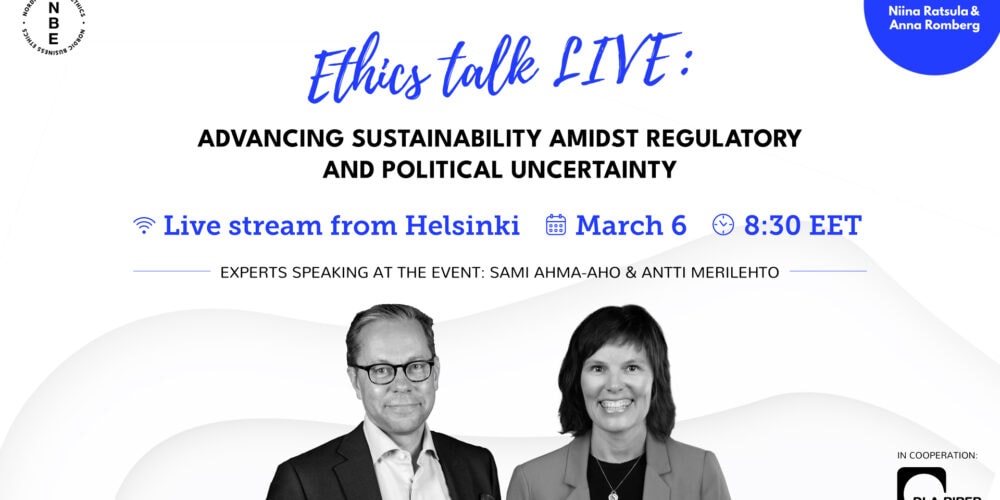Zakiya Serguro, what are the real ethical and compliance risks faced by Nordic companies?
Zakiya Serguro, Managing Partner of Frank Partners will join the Nordic Business Ethics Day on April 29th. Zakiya has spent the majority of her career in risk consulting with direct knowledge of best-practice solutions to assess Integrity and ESG risks identified in hundreds of due diligence, M&A, stakeholder analysis, political risk projects and investigations she has conducted in emerging markets, in particular.
To warm up for the Business Ethics Day we asked Zakiya a few questions:
Zakiya, based on your experience, what are the typical failures that Nordic companies face in third party due diligence in emerging markets?
“The first thing is expecting international business, especially outside of Europe and the US, to be conducted in the same way with the same understanding of bribery and corruption, for example. There are many cultural, regional and localised practices that are not considered compliant. Nordic companies, some themselves new to these policies, expect these things to be universally understood by third parties and voluntarily declared – exemplified in the types of terms used to describe these actions in documents such as a questionnaire that they ask their third parties to fill in. This is particularly true for emerging markets where European languages are not spoken.“
“The second is the erroneous belief that if the third party is historically trustworthy in delivering deals or quality products and services that they should be trustworthy in adhering to the Nordic companies’ requests for compliance without conducting independent due diligence. This assumption has been extremely costly for some Nordic companies as there is no place – including in the Nordics – where anyone deliberately conducting illicit or unethical business will openly declare it to their business partners when asked! It is not about blind trust, but about due diligence with integrity.“
“Thirdly, understanding the local context and what this means for potential, realistic mitigation measures when differences or adverse issues are found. We’ve heard managers in local offices of Nordic multinationals actually dismiss compliance policies or decisions issued from a distance by headquarters as inappropriate or inapplicable in the local context – resulting in superficial implementation and compromised reporting.
Essentially, companies find themselves in hot water when they believe that ticking boxes and distributing compliance policies constitutes an integrity check and reasonable mitigation – especially in high risk emerging markets. A culture of box-ticking is no culture of integrity at all.”
What are the top-three “must haves” in an effective risk management process?
“From the outset, we have seen that the most successful and effective ethics and compliance programmes (whether traditional compliance or ESG) have started with knowing your specific company’s risks and a risk-based approach where the resources are used proportionally to the risk. However, this is only possible when the top management and all the stakeholders realise that prevention is better than cure. No business is exempt and resources need to be made available early and quickly rather than waiting for a scandal to occur: as a principal goal for the organisation as opposed to a constant clean-up operation.
Cross-functional cooperation, integration and sharing of information as well as a culture of risk management throughout the organisation, rather than in isolation by the legal department or compliance team. We have found numerous instances where front-line staff or sales managers have in-depth knowledge of risks that the company faces, but are not consulted during the risk assessment phase or even after. Buy-in, cooperation and, indeed, a cultural shift is achieved not just through a formal programme of risk management, but through constant communication and relationship-building within all levels of the organisation so the knowledge of potential and real risks are widely known, understood, managed and reported timeously and confidently.
Realising early on that there is no easy one-stop solution or risk framework that can be copied and pasted. Each company and its operations are different, and therefore its risks are different. Consistent self-examination and improvement (rather than following costly trends), combined with investigative curiosity are the best foundation for an effective risk management process. The structures are important, but the human factor is what makes any process work. Like any programme, it depends on how motivated people are to apply ethical principles at every opportunity – a culture built through practical training and the right incentives. This is beyond tone from the top, but creates the teeth of the organisation – effectively managing risk by sharing responsibility to create resilience across the organisation. “
What are currently the burning topics within the ESG risks?
“Increasingly companies and investment firms have realised that ESG goes beyond general sustainability declarations and charitable projects, which were, historically, a side function to their main course of business. The last few years have pushed companies from pursuing purely profitable growth removed from the outside world to understanding their part as corporate citizens and stakeholders in the markets and sectors in which they operate.
Now we’ve entered the stage where companies that have been embracing the principles and voluntary reporting around ESG will be tested on whether they can make ethical decisions according to these principles, Whether they will be able to navigate this new space to become vehicles for a more ethical world in which companies and shareholders have re-imagined their business and the commercial value of their ESG goals. A great recent example of this litmus test is the removal of statements on the issue of forced Uighur labour by some companies in the garment industry following the Chinese government’s threats of boycott and commercial retaliation. Will companies choose to ‘greenwash’ away risks in the short-term only for them to re-emerge in a more pernicious form later?
Within this context, we have seen the most burning topics within ESG risk to be:
Climate-related risks and a common definition of sustainability being seriously considered by investors and corporations worldwide as holding the same weight as legal or financial risks. Climate risk assessments, including scenario analysis, are being performed by corporations to identify the likelihood of future climate hazards and the degree of business exposure to these hazards – as well their contribution to the problem: directly, through their own operations, and circularly, through their value chains.
Supply chain risk: Recently we have seen a spotlight on social and human rights abuses in the domain of supply chains, with binding legislation at national and regional levels. A few years ago, these regulations were merely applicable on a voluntary basis, showing an enforcement vacuum. This is changing quickly, especially in European countries such as Germany, where a supply chain law is likely to be passed in the near future.
Human rights: There is a movement towards good governance that recognises the importance of human rights as representative of a company’s business ethics. There seems to be a coalescing of the concept that a company’s practices internally as well as their influence externally with business partners, needs to be aligned to their own stated values. Any signs of hypocrisy or inconsistent standards at home (in the Nordics, for example) and abroad (both on the sales and supply sides) is seen as dishonest and as a signal of poor overall integrity.
Any other thoughts you’d like to share with the NBE?
“As long-time practitioners and consultants in the field, we have always held the opinion that business ethics should be holistic and integrate both traditional compliance, reputational and integrity risk together with ESG. Superficial division of these risks has resulted in an inefficient and ineffective approach to risk management leaving the frontline of the business to deal with sometimes contradictory policies, processes and incentives.
A commitment to (compliance) integrity and ESG principles by any organisation can be measured in their attitude of wanting to know and understand these risks early and thoroughly in order to pro-actively manage them. This is characterised by candid discussions by key stakeholders to develop an actionable strategy to mitigate the risks instead of downplaying or avoiding facing the risks. It is not about obstructing business, but about integrating into business the opportunity for creating value through coherent, responsible and ethical conduct across the board.“
Make sure to join us on the Nordic Business Ethics Day on April 29! Thank you Zakiya for your inspiring insights!
As a Managing Partner of Frank Partners, Zakiya Serguro has been trusted to guide her clients, almost exclusively Nordic multinationals or investment firms, through the set-up of practical and customised, global risk frameworks – consulting companies on their internal risk assessment and mitigation practices. Her frank and honest approach has seen her work closely with several clients on their compliance journeys as an expert advisor with an ear to the ground.
Zakiya developed Frank Partners’ unique due diligence research training programme for compliance teams in private companies to empower them to conduct their own internal due diligence at international standards. As an anti-corruption advocate, Zakiya has provided independent, experienced insight on the real ethical and compliance risks faced by Nordic companies and how they can best address these risks globally in various public forums.
Prior to joining Frank Partners, Zakiya was a director on the Africa desk at one of the industry’s founding companies, before which she worked in the banking industry and for a think tank specializing in Africa and Middle East policy. Currently based in Johannesburg, she has also lived and worked in the UK, India and North Africa and travelled extensively across sub-Saharan Africa and the Middle East consolidating her regional experience.



